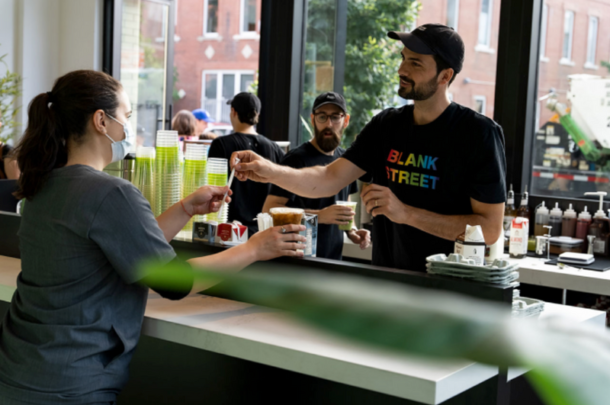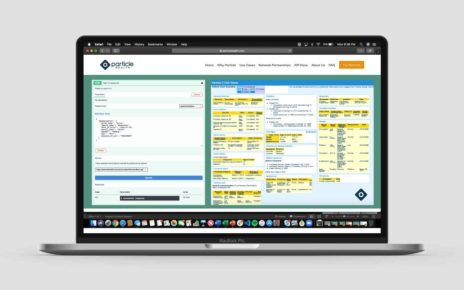NEW YORK — Blank Street, a Brooklyn-based specialty coffee company with 14 micro-format locations in Manhattan and Brooklyn, has announced a $25 million Series A investment led by General Catalyst and Tiger Global, along with additional strategic investors including Neil Blumenthal and Dave Gilboa (Founders, Warby Parker), Jeff Raider (Founder, Warby Parker and Harry’s), Joey Zwillinger (Founder, Allbirds) and global real estate firm Tishman Speyer.
Following a $7 million Seed raise earlier this year, the new Series A funding will help fuel Blank Street’s rapid retail expansion, with a focus on evolving its vendor partnerships and technology capabilities.
In August 2020, Blank Street debuted its first location, a mobile coffee cart, at the iconic Wythe Diner in Williamsburg. Following a year of significant growth, the company now operates 14 locations throughout New York City: a mix of micro-footprint brick-and-mortar spaces — about the quarter of the size of an average cafe, and mobile street carts in partnership with EV Foods — which produce zero-emissions and zero-sound. While on the surface Blank Street looks like a neighborhood coffee shop, the company operates more like a micro-retail marketplace, serving beloved Brooklyn-based purveyors such as Parlor Coffee, Gertie bagels, King Street Baking Co., and King David Tacos. Currently, Blank Street can be found in Williamsburg, McCarren Park, Downtown Brooklyn, Boerum Hill, DUMBO, Cobble Hill, SoHo, Washington Square Park, and the Upper East Side.
“Blank Street has quickly established itself as the newest contender in NYC’s high-growth specialty coffee race,” says Youngme Moon, newly named Blank Street board member and Harvard Business School professor. “While they’ve quickly created an impressive coffee business, I was drawn to the way the founders are reimagining the entire micro-retail experience for urban customers. I look forward to being on this journey with the entire Blank Street team as they continue their expansion throughout NYC and across the U.S.”
In addition to fueling Blank Street’s ambitious goal of operating 100 locations throughout NYC by the end of 2022, the new funding will spur the launch of “Powered By Blank Street,” a wholesale partnership agreement designed to empower local vendors to sell in new neighborhoods without the hassle of finding expensive storefronts, providing their own labor, or managing day-to-day operations. The company will debut this new model with Brooklyn-based King David Tacos (KDT), where KDT’s coveted breakfast tacos will be served alongside Blank Street’s coffee and tea drinks. Multiple “KDT Powered By Blank Street” mobile carts will roll out throughout NYC in the coming weeks.
Another priority is Blank Street’s commitment to elevating the customer experience through innovative technologies. Its order-ahead, mobile payment and rewards app accounts for up to 20% of transactions company-wide, a percentage they’ve maintained as they’ve scaled into new markets across New York City. With the booming on-demand economy, the funding will enable Blank Street to expand its app capabilities as more high-quality local vendors come onboard.
Blank Street was founded by two immigrants, Vinay Menda and Issam Freiha, who moved to the US to attend NYU and Columbia, respectively. While at university, they began to study the coffee culture in New York City.
“I grew up in a culture where we mostly drank coffee at home, so it was a revelation to come to NYC, one of the most caffeine-saturated cities on earth, and see coffee vendors on every street corner,” says co-founder Issam Freiha. “I noticed my friends going to Starbucks for the convenience, Dunkin’ for the price point, and specialty coffee shops for the quality. But as students, we couldn’t afford a $6 cappuccino every day. What we needed was a one-stop shop: a place to get exceptional coffee at an accessible price point, crafted with speed and efficiency.”
Soon after graduating, Menda and Freiha co-founded Reshape, a NY-based venture capital fund with $100M of assets under management. They had their eyes on a cluster of high-growth, mobile-first, food-retail businesses making waves in Asia, such as Kopi Kenangan in Indonesia and the Chinese brand Heytea. Both brands achieved explosive growth by selling high-quality coffee and tea from tiny retail spaces.
“We realized the opportunity in the U.S. was quite greenfield,” says co-founder Vinay Menda. “We could take high-quality products, starting with specialty coffee, and make them more convenient and affordable through our unique approach to real estate. By shrinking our location footprint, and therefore shrinking our fixed costs, we could offer specialty food and beverage at a lower price point than our competitors — and scale up much faster.”


